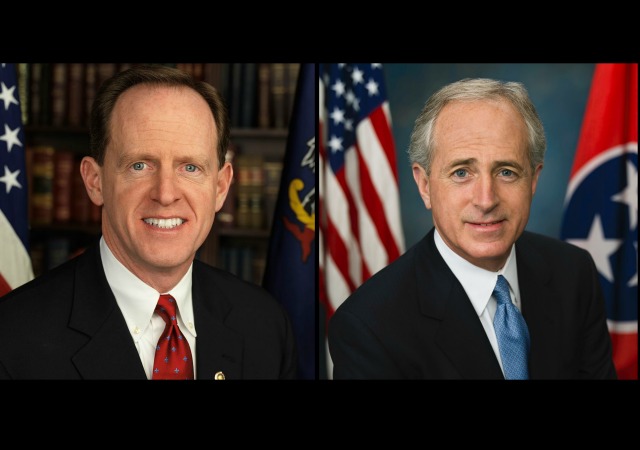Toomey, Corker Announce ‘a Path Forward on Tax Reform’

Sens. Pat Toomey (R-PA) and Bob Corker (R-TN), two members with opposing views on fiscal policy, have announced “a path forward on tax reform” that “would allow for a tax reduction, as scored on a statistic basis, over a 10-year period.” They hope to Senate Budget Committee will vote on said plan next week.
The senators did not release any details about the plan, but new outlets have stated it will allow tax reductions up to $1.5 trillion. The Wall Street Journal reported that the “agreement would allow Republicans to lower tax rates while making fewer tough decisions on what tax breaks to eliminate to help pay for the cuts.”
Corker and Toomey released this press statement:
“I am strongly committed to pro-growth tax reform that will lead to more jobs and higher wages and was glad to work with Chairman Enzi and Senator Toomey at the request of Senate leadership to reach an agreement that will allow the committees of jurisdiction to begin their work to craft this important legislation,” said Corker. “While each member of the caucus will have to make their own decision, I believe our agreement gives the tax writing committees enough headroom to achieve real tax reform that eliminates loopholes and lowers tax rates for hardworking Americans. I will be watching closely as the tax reform legislation is drafted, and ultimately, my support will be contingent on a final package that generates significant economic growth and does not worsen but hopefully improves our fiscal situation.”“I am confident the budget agreement I have reached with Chairman Enzi and Senator Corker will give the Finance Committee the headroom needed to write a pro-growth tax plan that reforms the code, causes the economy to surge, and ultimately results in reduced federal budget deficits,” said Toomey.
As I mentioned, Toomey and Corker are on opposite sides of fiscal policy. The fact that they have come together in an agreement has given some GOP senators a glimmer of hope. From The Hill:
“Corker and Toomey probably represent the far end of the spectrum within our conference of what they want to see that look like, and the fact that they’re getting together leads me to believe that we’re close to getting a budget that they can put out of committee and we can consider on the floor,” said Sen. John Thune (S.D.), the No. 3 Senate Republican.
The Financial Times explained how the compromise will remove a hurdle for the Senate Republicans:
The compromise between Mr Toomey, who has been willing to countenance steeper cuts than the more fiscally conservative Mr Corker, should permit the Senate to move towards a budget resolution. This will be needed to allow so-called reconciliation instructions in the Senate, which would allow Republicans to cut taxes without being stymied by the Democratic filibuster.The move clears a procedural hurdle and makes it clear that the Republicans are ready to slash taxes without fully making up the losses through revenue-raising reforms over a 10-year window. Going down this route under reconciliation will potentially require the party to agree to terminate some of the tax cuts before the decade-long window is ended.
The Senate rules state that “legislation cannot add to the long-term deficit if it is to pass under reconciliation rules.” If it does, then the “tax cuts may have to be temporary.”
Sen. Ron Johnson (R-WI), who also sits on the committee, said that he thinks “a 10-year, $1.5 trillion cut ‘ought to be a minimum.'”
If the Senate votes on the budget, the lawmakers would then have to “align it with the House budget that came out of committee in July.” The Wall Street Journal continued:
As written, the House budget likely doesn’t allow for as large a tax cut as the Toomey-Corker pact and is tied to more than $200 billion in cuts. Those gaps will require a House-Senate negotiation.Then, using the size of the tax cut in the budget as the maximum, the House and Senate would each write their own tax bills. Those measures are likely to diverge from each other and force lawmakers into the trade-off debates and lobbying fights that have prevented a major rewrite of the tax code since 1986.
CLICK HERE FOR FULL VERSION OF THIS STORY